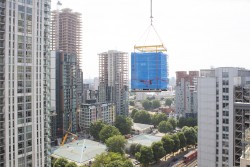Modular construction has gained considerable momentum over the last 18 months, as was clearly demonstrated at the recent sell-out Modular Matters conference. Darren Richards, Managing Director of leading offsite experts, Cogent Consulting outlines why this alongside the wider use of bathroom pods can transform project delivery.
The new Industrial Strategy mandating the use of offsite technology on a range of publicly financed construction initiatives is just one the driving forces behind innovations in this rapidly developing sector.
The particular success and appeal of module manufacture rests in the repeatability of units. Load-bearing modules can be steel or timber-based and are pre-fitted with electrics, plumbing, heating, doors and windows, together with internal finishes. The modules are commissioned prior to leaving the factory, ensuring that defects are minimised. By assembling modules in a precision-controlled factory environment, the production line techniques that drive module assembly bring speed of delivery, enhance the quality of the end product and dramatically improve productivity. Although module selection can be significantly influenced by transportation dimensions, they are suitable for any building sector but are very popular in the education, healthcare, leisure and student accommodation sectors.
Mechanical, electrical and plumbing (MEP) services include a number of 'plug and play' technologies pre-installed at the factory for plant-rooms, with pipework, cable-management and ductwork for building services in-situ. These are integrated in multi-service modules mounted in the ceiling, under the floor or in-service risers. Mechanical ducting or pipework systems/modules are often combined with electrical service distribution. These units are packaged or skid-mounted as pre-assembled units, pre-finished in the factory for straightforward mains connection onsite.
Moving this kind of work offsite means potentially dangerous practices such as working at height, hot works in restricted spaces are vastly reduced. As with all offsite manufacture this creates less waste, less noise and efficient material delivery to site, thereby reducing programme times. Taking MEP services offsite also means early testing, commissioning and programme assurances can be secured.
Pod technology creates substantial building elements that form a 'volumetric space' but are generally non-loadbearing. Pods can be bathrooms, shower-rooms, kitchens, utility cupboards and office washrooms. They are usually craned into a building during super-structure erection but can also be retrospectively installed via external cladding apertures and lift shafts or delivered as flat-pack assemblies.
Pods are commonly steel frame, composite or made from glass reinforced plastic (GRP). The construction of the pod generally includes the plasterboard, ceramic or porcelain tiles, sanitary and brassware. Pod technology is robust, low-maintenance, cost-effective and are usually bespoke to meet a project requirement in terms of shape, size and specification and are connected easily onsite. Unlike traditional building methods, where a multitude of trades such as electricians, plumbers, plasterers or tilers need to be co-ordinated, factory-fitted pods require little supervision onsite and finished pods can be integrated into any structural frame - timber, steel or concrete.
Products are emerging that are targeting more of a 'tool kit' approach to the adoption of assembly, with the leading of these being prefabricated utility cupboards (PUC). PUCs provide a central interface point for mechanical, heating and ventilation configurations. Packaging up high levels of labour both in terms of skills and hours into a concentrated offsite delivered solution - the rise in the specification of PUCs is driven by the UK volume housebuilders. This innovation has required a change in the approach to procurement and a re-profiling and re-sequencing of traditional skilled trades onsite, but many are now seeing the benefits in terms of programme certainty and a reduction in 'snagging' activity associated with the MEP services activity. Capable of integrating any project arrangements, PUCs are constructed to accommodate hoisting requirements and can be installed without the need for bespoke plant.
Bathroom pods provide a quality, factory controlled modular construction solution that is manufactured to a high degree of standardisation - making them ideal for large-scale building projects such as student accommodation, private rental and hotel schemes. Such developments can be made significantly more efficient and profitable through the use of these modular bathroom units. One of the greatest benefits that comes with this flexible building systems, is their range of customisation options - making bathroom pods suitable for anything from a five-star hotel development to student accommodation. Volumetric modular and pod solutions are becoming increasingly commercially viable. It is clear that economies of scale are being realised and modular construction is becoming a truly viable alternative to traditional construction techniques.
For more information visit: www.cogent-consulting.co.uk
Images: Courtesy Offsite Solutions
Original Link - Offsite Magazine









